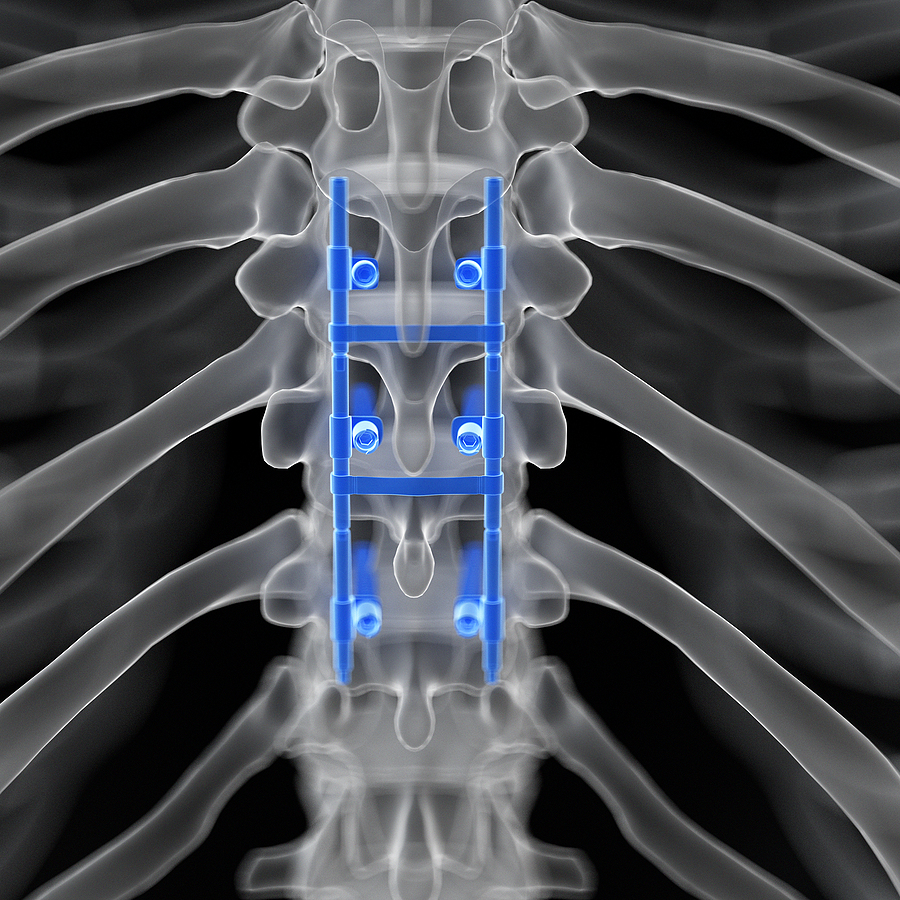Back pain is a prevalent condition that affects millions of people globally. Spine fusion surgery is a complex and delicate procedure that can be used to treat a variety of cervical spine issues, including herniated discs, spinal stenosis, and degenerative disc disease. Because it is a major surgical procedure, I think it is important to educate my patients on what spine fusion surgery is, its benefits, who may or may not be a good candidate for this procedure, as well as its risks, considerations and what to expect during and after.
Understanding Spine Fusion Surgery
Spinal fusion is a surgical procedure that fuses two or more vertebrae in the spine to alleviate back pain. Bone graft material is placed between the affected vertebrae, and metal implants or screws hold them in place until the bone graft material fuses with the vertebrae. The surgery reduces pressure on the spinal cord and nerve roots, restores stability, and provides pain relief. The specific technique used in spinal fusion surgery depends on the location and extent of the damage.
Posterior Fusion
Posterior fusion is a technique that involves making an incision on the back of the spine to access the damaged area. I remove the damaged or degenerated disc material, and fuse the vertebrae together. This technique is often used to treat conditions in the lumbar (lower back) and thoracic (mid-back) regions of the spine.
Anterior Fusion
Anterior fusion is similar to a posterior fusion, but instead of accessing the damaged area from the back of the spine, I will access it from the front. This is more often used to treat conditions in the cervical (neck) and lumbar regions of the spine.
Benefits of Spine Fusion Surgery
Pain Relief
One of the primary benefits of spine fusion surgery is the relief of neck and arm pain. By fusing two or more vertebrae together, pressure on the spinal cord and nerves is reduced, which can alleviate pain.
Improved Stability
Spine fusion surgery can also improve the stability of the neck by fusing vertebrae together, which can prevent further degeneration and reduce the risk of injury.
Improved Mobility
By reducing pain and increasing stability, spine fusion surgery will improve your mobility, so you can move freely. You may even be able to return to activities that were previously limited by neck pain.
Who is a Candidate for Spinal Fusion?
Spine fusion surgery may be recommended for individuals who have tried conservative treatments such as physical therapy and medication, but have not experienced relief from these symptoms.
- Herniated discs
- Spinal stenosis
- Degenerative disc disease
- Spondylosis
- Scoliosis
- Spinal fractures
Before undergoing cervical spinal fusion surgery, a comprehensive evaluation must be conducted to determine whether this procedure is appropriate for your specific condition.
Who Should Avoid Spine Fusion Surgery?
The following conditions might disqualify you from being able to receive spine fusion surgery.
- Back and neck pain symptoms that have not been prevalent for more than six months
- Individuals with severe obesity, as they are at higher risk for complications during and after surgery
- Patients who have a condition that affects bone density or quality, such as osteoporosis
- Individuals with certain medical conditions or who take certain medications that may interfere with bone healing, such as rheumatoid arthritis or steroid medications.
- Patients who are 65 years or older
- Smokers

Risks of Spine Fusion Surgery
Although my team and I are highly experienced, all surgeries pose a risk. I feel it is important that our patients understand the potential risks associated with spine fusion surgery.
Infection
The risk of infection after spinal fusion surgery is low, but it can occur. Signs of infection include redness, swelling, and fever. You will be monitored closely for signs of infection after surgery.
Nerve Damage
Nerve damage is a rare but potentially serious complication of spinal fusion surgery. It can cause weakness, numbness, or tingling in the legs or arms.
Hardware Failure
The hardware used to fuse vertebrae together can fail over time, requiring additional surgery to correct the problem.
Blood Loss
Bleeding during and after the surgery is possible, but it is rare. If you are taking blood thinners or have a bleeding disorder, you will have a higher risk of bleeding complications.
Blood Clots
Blood clots can form in the legs or lungs after surgery, especially if you are immobile for an extended period. It is essential that you follow all post-operative instructions to prevent blood clots from forming.
Failure of Bone Graft Fusion
This is known as pseudoarthrosis, and can cause more pain at the graft site. Smokers are at a much higher risk of this complication than non-smokers.
Post-Operative Care for Spine Fusion Surgery
Recovery Process
Recovery from cervical spinal fusion surgery can take several weeks to several months, depending on the extent of the surgery and your overall health. Most patients will need to stay in the hospital for a few days to a week. During this time, you will be monitored for any complications from the spine fusion surgery. You will also be required to keep the spine immobilized as often as possible. This may involve wearing a back brace or using a cervical collar for several weeks after the surgery.
Restricted Activities
You will need to avoid certain activities, such as lifting heavy objects and bending. Because of this, you may have to take an extended absence from work and other social activities.
Physical Therapy
Physical therapy is an important part of the spine fusion surgery recovery process. You will work with a physical therapist to help regain strength, flexibility, and mobility. Physical therapy will also help reduce the risk of complications, such as blood clots.

Don’t Suffer in Silence
If you are experiencing spinal issues that are affecting your quality of life, we encourage you to schedule a consultation with us. At The Institute for Comprehensive Spine Care, we are dedicated to providing personalized treatment plans that address the unique needs of each patient. With over 20 years of experience in treating spinal conditions, we strongly believe in the benefits of preventive care and minimally invasive surgeries.
We prioritize clear communication and personalized attention to help reduce pain, increase mobility, and improve the overall quality of life for our patients. Our goal is to work collaboratively with patients to develop a comprehensive treatment plan that addresses their specific needs and goals.
With our extensive experience in spine fusion surgery and our commitment to patient education, we believe that we can provide you with the best possible care for your condition. Contact us today to learn more about how we can help you live life to the fullest.
















